July 6, 2021
Comunidad Guest DJ: The Empress
July 27, 2021
Comunidad Guest DJ: Chef Edwin Sandoval
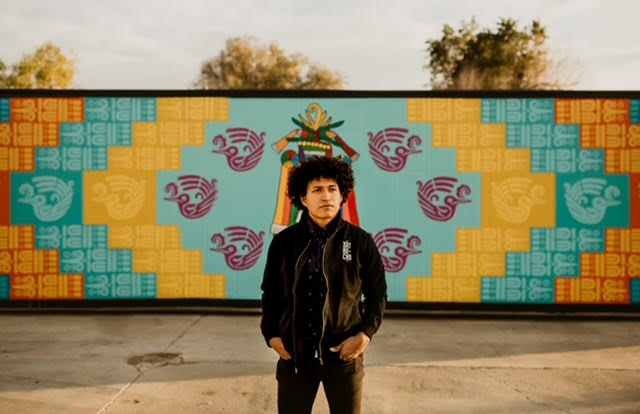
Courtesy of guest.
"Pop up oyster bar" is not a term I expected to run into in Denver. That is, however, how I met Chef Edwin Sandoval in person. In fact, he was running it. Chef Sandoval runs Xatrucho, which specializes in pop up and private dining events - and since we met at the pop up oyster bar, I've been able to try out more of his food (including a rose sorbet? It was as amazing as it sounds). Chef Sandoval is creating his own food scene here in Denver, and expanding past private events with an upcoming micro-menu at Enigma Bazaar on the Northside 6 nights a week, which was just announced earlier this week. Get to know Chef Sandoval a bit better, and let's also revel in the blending of the traditional and new (much like his food) in his playlist below!
| What do you do in the Denver community: I am a chef that focuses on private dining and events with a primary focus of showcasing Latin inspired cuisine. Currently bringing attention to Honduran food through a pop up format, and in mid August I am going to start my new partnership at Enigma Bazaar, a super cool new arts and music mini venue in north Denver. Tell me more about your background: I was born in Honduras and moved to the states as a 10 year old kid. I got involved in the Denver community through food. When I was 21 I landed a sous chef position at a French bistro downtown and continued to work in fine dining restaurants until about 4 years ago when I decided to launch XATRUCHO. Tell me more about your Latinidad: I am very outspoken about my constant support to the Latino community, I find myself continuously putting my culture in the forefront of my cuisine and work projects. Why does representation matter in your community work: In cooking and food industry I feel that authenticity can be easily lost, for me it's extremely important to be from the Latin community and be able to own and operate a business that focuses on writing a positive narrative from a cultural stand point. What is one way the community can uplift Latin work/voices/art: Support Brown owned businesses, share their work. Tell your friends about the things that Latin artist are doing. Overall be mindful in regards to where you spend your time and money, I truly believe we can start doing more business/collab among ourselves to develop a better economy within our artist communities. |
Follow Xatrucho on Instagram here.
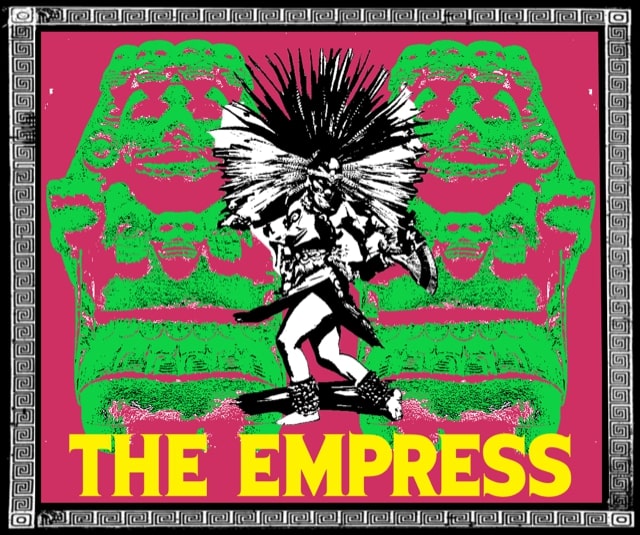
One of my favorite areas in Denver is Westwood. A friend recently called it one of the last, true barrios of the city. Though Westwood, like many many areas of the city that Chicanos have called home for generations, is being gentrified, Westwood holds its own. There is a strong sense of pride and and community that spreads from Morrison Road and into the side streets, pumped into the businesses and restaurants. My guests this week create the images for the comunidad en Westwood, and for Chicanos across the city - The Empress. I was introduced to them back in 2019, at BUCU Southwest Chili Fest, where I didn't have enough cash on hand to buy all I wanted - but I did score the Mexica tote bag, candles, stickers, and t-shirts with Coatlicue that are still in regular rotation. 2 years later and I still have to save up to get the new new. The Empress is a family business in Westwood, that not only creates these images, but assists and supports in putting on events that celebrates and uplifts la comunidad in Westwood, including Cinco De Mayo, Dia de Independencia, Dia de los Muertos, and the upcoming Frida Kahlo Celebration of Life this Saturday (feliz cumple, Frida!). Read more about The Empress, and check out their playlist below!
| What do you do in the Denver community: We are a collective of Mexican/Mexica artists from the Westwood neighborhood. We predominantly screen print, paint murals, and host community events. Tell me more about your background: Our collective is mostly the Jaramillo family, my father Santiago and my older brother Santi started this about 10 years ago. We are all born and raised Westwood residents. Originally we were operating out of a small building on the corner of Morrison road doing art shows and first Friday events, the first Frida showing was there! Now my brother Zion and myself (I’m Lala!) operate a print shop just a ways down the road. We also have our own Mateo Rodriguez that helps with photography, embroidery, and really everything! Tell me more about your Latinidad: Westwood is somewhere we all call home. The residents of this neighborhood support each other’s business and crafts and all of the above. My neighbors own the restaurants and Mercaditos we frequent, we help them with art for their businesses or a place to display their craft. We are creating a space where we can continue to uplift and help our community flourish. Why does representation matter in your community work: Without proper representation of different brown communities, we lose our heritage and our voices. We lose our ancestors teachings. We lose our art We lose our languages. The Empress’ output is 90% Mexica imagery and Aztec codexes passed down to my father. Without proper representation of brown creators we allow gentrifiers into our spaces to demolish and disband and erase what we create. Fuck your Sprouts and Whole Foods, we have David and his farm down the street. What is one way the community can uplift Latin work/voices/art: Considering that we have gone back to “normal” over the last couple of months, support your local elotero! Buy people’s art if there’s an event! Get the food your homies selling! Give back to those around you. Come hang out at our 9th annual Frida Kahlo Celebration of Life on July 10th! There will be over 30 vendors from all over the Denver Metro Area, along with loads of other stuff. We also have LOST BOYS skate jam/punk gig at the end of August and Muertos soon after! |
Follow The Empress on Instagram here.
June 8, 2021
Comunidad Guest DJ: Zee Arellano
I have only known Zee very briefly, but I am simply blown away by how much they do. Not only here in the Denver community, but throughout Indigenous and migrant communities as well. Important, hard work. I am inspired by their passion, their drive, and their commitment to uplifting and supporting community. I am particularly inspired by this playlist, which you can find below after you become inspired yourself - read more about Zee, and dance along with 10 of their favorite songs!
| What do you do in the Denver community: I ebb and flow throughout the Denver community as a playful otter, a community organizer, a youth educator, a co-parent to a brilliant fire femme warrior and an active and present weaver bringing together life and community wherever I go. Tell me more about your background: Anyone who knows me will automatically name that I rep Chicago through and through. I was born and raised on the northside of Chicago and spent time on the south side of Chicago predominantly in Black and Latinx barrios. As a first-generation being, I ventured into Colorado for college and after graduating found myself creating a home within the queer BIPOC community in Denver. I started getting involved in youth and community organizing and planted seeds that began to root and create networks of care, nurturance and holistic healing. Tell me more about your Latinidad: I identify as a first-generation genderqueer light-skin/white passing Latinx being. As a child of immigrants while also holding the privilege of having light-skin, I have learned to navigate ways to center and validate my Latinidad experiences while centering Latinidad voices that are often ignored or forgotten--specifically my afro-latinx and indigenous siblings. I have been on a journey to connect with my indigenous roots and also heal the colonizing Spanish roots found within my bloodstream. Why does representation matter in your community work: Representation is crucial to the growth, maintenance and evolution of our communities, especially for our black, indigenous, queer, trans and disabled communities. Representation makes us seen, felt and heard. It makes society SEE that we exist and thrive and LIVE outside of their imagination and representation plants seeds of us inside their imagination. When working with youth, migrant communities or trans asylum seekers I make it a priority to bring different identities to the forefront so they can be weaved into their experiences and stories. Our art, voices, songs, ancestry, history, medicines and more are powerful enough to create new worlds and ways of being and by allowing representation to take hold we can invite others to dream alongside us. What is one way the community can uplift Latin work/voices/art: One important way that community can uplift Latinx work,voices and art is by doing the work to heal and challenge their own biases when it comes to what they think of when they hear the word Latin. Oftentimes people have a monolithic or homogenous framework or vision when deciphering the term Latin and it often creates gaps in representation and voices. By doing that internal work first, people can begin to expand and open their worldview and invite all forms of Latinidad into their consciousness which then brings more possibilities for Latin work, voices and art to be held, seen and heard. Another way community can uplift Latin work, art and voice is by utilizing their networks and own voices to AMPLIFY the dope work that our Latinx community members are doing. I believe in the power of weaving and envision a mycelium network amplifying and supporting all forms of Latin work, art and voice. |
May 4, 2021
Comunidad Guest DJ: Sheree Brown
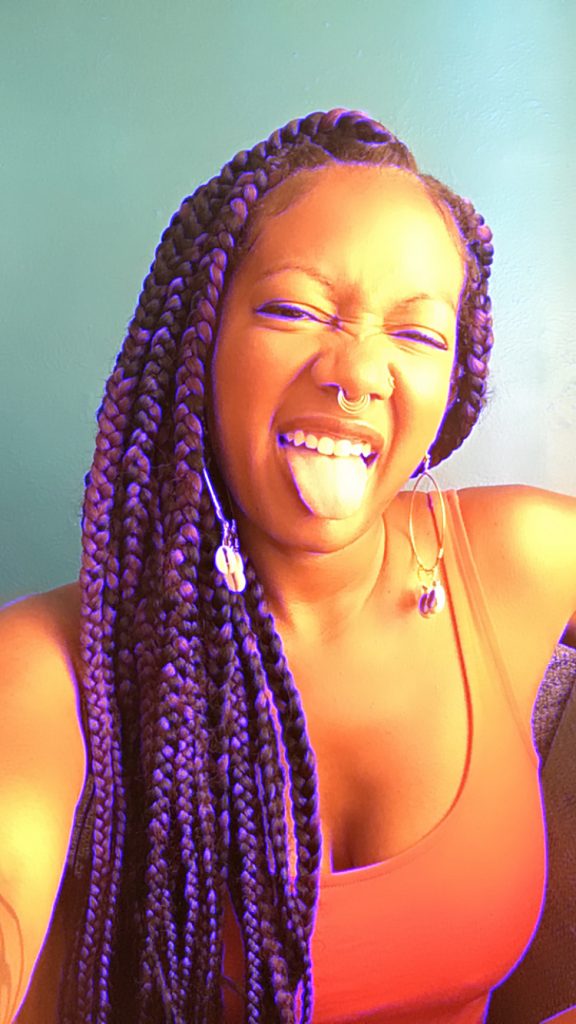
Photo courtesy of guest
Sheree Brown contains multitudes. I was first introduced to Sheree through her poetry, which is healing, my friends. But she does so much more in the community, including wellness and ancestral healing. Sheree's is a name that you'll hear in multiple places around the Denver community, and for good reason. I'll let her explain more, and be sure to listen to her amazing playlist below!
| What do you do in the Denver community: I’m a mother to a fire child. I write, make art, and tend to plantitas. I support community wellness, healing, organizing, Black Liberation + rest efforts. I make medicine, and rest in hammocks. I actively place Black people in the future through prayer/art/magic/imagination/organizing, and supporting organizers that do work around securing Black Futures. Tell me more about your background: I’m was born in Denver, so I’ve always had a connection. I began to really nurture my relationship to Denver through offering my time y corazon to work I believe in, especially through the healing arts. I started a healing arts collective, Ancestral Herbalism, where we skill-shared traditional healing ways in support of reclaiming our community agency and wellness. I’m also deeply immersed in the arts scene, forever amplifying and supporting my artist familia. Tell me more about your Latinidad: I identify as Black Xicana. I honor my mestizaje, reclaiming that word to embrace my mixed being as indigenous, Black y Mexicana. I am 3rd generation Mexicana, and my Black relatives are from the South. AfroMexicanas exist, and we out here! Why does representation matter in your community work: Being able to see reflections of ourselves in community is everything. As young people starting out in any field, we need to know that people like us exist. As a Black Queer Xicana practicing hood medicine, conjuring Black futures, and raising babies, I hope that visibility resonates to someone coming up. Representation is a sacred reminder for folks to be their most authentic selves. What is one way the community can uplift Latin work/voices/art: Community can help to amplify our stories, share our art with appropriate credits, drop our names for paid opportunities to highlight our work, buy our art/books/music/merch, and affirm the work we are all doing. Collaborations are amazing! Remember that we all need the resources to eat, support our families, buy supplies, rest, and keep the resources circulating to other artists and organizers, so honor the value of our work by paying full price, and seeking our expertise where it matters! |
Follow Sheree Brown on Instagram.
April 20, 2021
Comunidad Guest DJ: Jimmy Maldonado
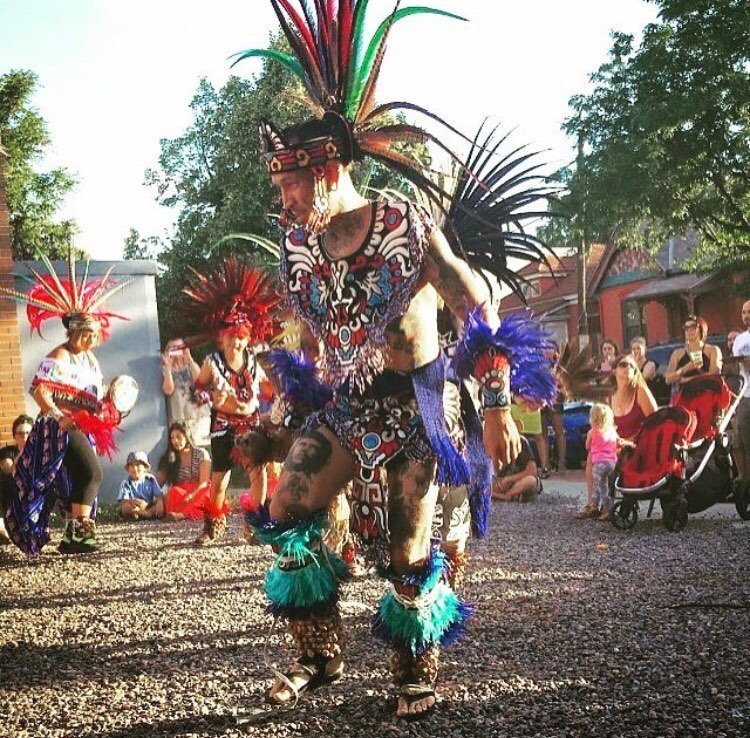
Courtesy of guest
Piercings have long been a part of the history of the peoples in the lands now known as the Americas. Now, it's an ancestral link, connection and form of healing. A continuation of la cultura. Jimmy Maldonado is dedicated to connecting with and healing ancestors, not only through his work piercing at Sol Tribe Tattoo & Piercing on South Broadway, but also through danza and more. I know Jimmy through these ties to community and I'm so excited he's my guest DJ this week! Read more about him, and check out his playlist, below:
| What do you do in the Denver community: I am a professional body piercer at Sol tribe and a keeper of traditions. Mitotiani. Mexica danzante. Tell me about your background: I am one of 12 and the son of immigrants. My family is from Mexico. I was raised Chicano, but my roots are of Mixteco and Nahua. I've always been a part of the Denver community, whether it was from me piercing people, or keeping our culture and traditions alive through Danza at schools, or other community cultural events Tell me about your Latinidad: I mainly identify with my indigeneity. Spending a lot of time in Mexico from the time I was a chamaco (kid) to my adult years. I've always been inspired and amazed at how strong and resilient our indigenous brothers and sisters are and have always been. Puro sangre indigena! I guess I've always grown up this way. Why does representation matter in community work: Representation matters so much, especially for our Native, indigenous, Chicano, Mexican, LGBT, and poc communities. It's important to create a future where our future generations can thrive, be heard, valued, respected, and set up for success. What is one way the community can uplift Latin work/voices: Support our gente's businesses and artists. Listen to our voices without trying to shut us down. Support your local street vendors, and continue to fight to get our kids out of cages. |
Comunidad Guest DJ
Tracie Trinidad
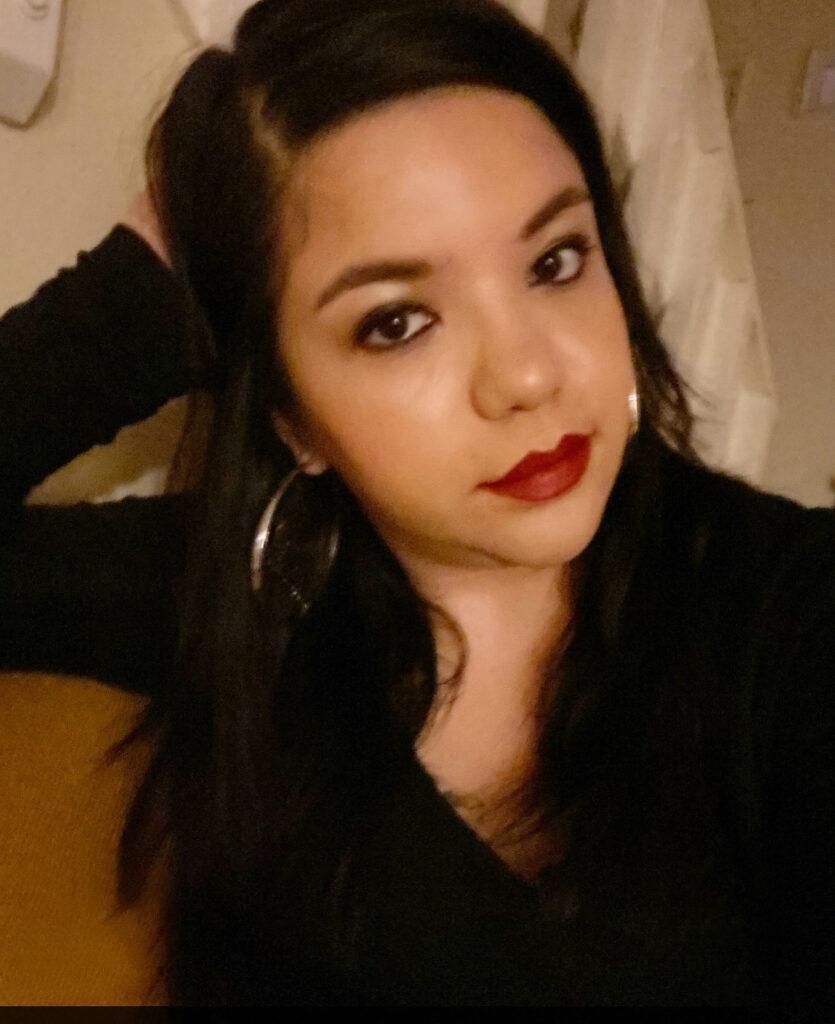
Provided by guest
One time, Tracie Trinidad called me a chingona and I will never forget it, because Tracie herself is la chingona. She's a student and educator, and she's ridiculously inspiring to those around her. I know Tracie as a Chicana in our community, educating and influencing those around her. Get to know Tracie better, and try not to be pumped after listening to her playlist below!
| What do you do in the Denver community: Educator, activist in ed policy spaces, and 4th year PhD student at DU. Tell me more about your background: I am from Brighton originally, and growing up my parents would always make my brother and I have family dinner every night. If we weren’t hungry, we were still expected to sit at the kitchen table and spend time as a family. This was the time my parents would have critical and honest conversations around racial justice and education with us. We heard stories about my parents being treated unfairly in their school experience. Which led me to working in education and really changing the way we discipline students in K-12. I want to ensure that minoritized and marginalized students are being treated fairly in schools. Tell me more about your Latinidad: I identify with Xicana feminism, which is rooted in resistance of white dominant culture, keeping and passing of political and social justice culture, sustaining cultural intuition and finally, maintaining spirituality, which can assist us in challenging racism, sexism, and other forms of psychic oppression. Through this epistemological framework, this has guided me to be in education policy spaces. Why does representation matter in your community work: I work in education and it is important for us to be in spaces where decisions about our education and future are being made. I always reflect on this quote, "Who is imagining, and who is being imagined.” We have to show up to school board meetings and any other stakeholder meeting to discuss what our community wants when it comes to discipline, curriculum, school culture, and even be a part of the hiring process for school leaders, otherwise we will be the ones being imagined. What is one way the community can uplift Latin work/voices/art: Support local organization that amplify the voices of our community, buy art from local artists and support our local musicians by attending concerts. |
March 16, 2021
Comunidad Guest DJ: Adonia Arteaga
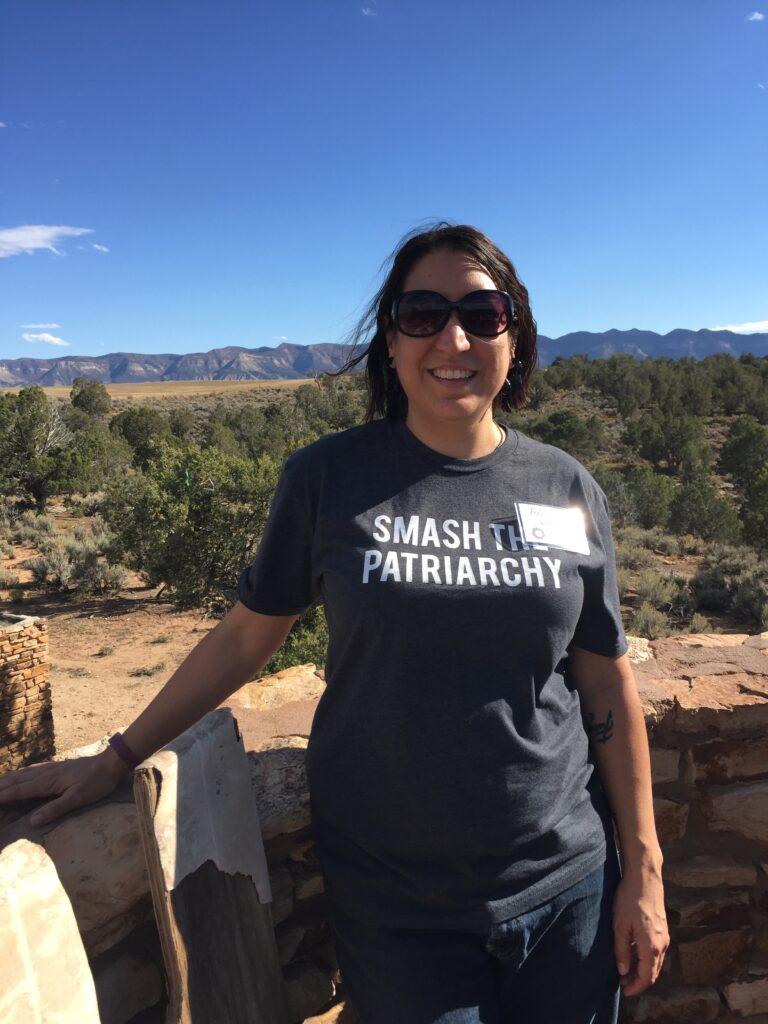
Photo courtesy of guest
I first met Adonia Arteaga volunteering for Girls Rock Denver. I was able to teach intro bass, and it seemed like Adonia was doing the most. First off, she was able to host the week long music camp at the school she is assistant principle at, Ricardo Flores Magón Academy in the Northside. Second, though, she was also ensuring the campers were taken care of in whatever capacity they needed. It's obvious that Adonia is here to guide our next generation, let them find their voices, and become leaders in our community. I'll let her explain more on all of what she does below, but I am thrilled to welcome Adonia as this week's Comunidad Guest DJ - read more about her, and check out her flawless set below!
| What do you do in the Denver community: I am an assistant principal at Ricardo Flores Magón Academy a rigorous and inclusive K-8 public charter school that focuses on academic achievement, community building, and social justice. At Ricardo Flores Magón Academy, we value humility, problem-solving, diligence, dignity, and unity and we support our students in gaining the skills to live up to these values every day. I am also on the coordinating committee for Girls Rock - Denver, an organization that provides a week-long summer music camp for girls and gender non-conforming individuals. Girls Rock believes in empowering our youth to express themselves and challenge the status quo by using music as a vehicle to make a change in our world. Tell me more about your background: I was born and raised in Flint, MI (Anishinaabe land) and I moved to Denver (Cheyenne & Arapahoe land) in 2011. I moved here to take a teaching position at Ricardo Flores Magón Academy as part of Teach for America. Most of my community involvement centers on education and the families at my school. One of the many reasons that I love Ricardo Flores Magón Academy is our commitment to social justice and Comunidad, as such, I support our students in using their voices and writing to challenge systems of oppression. In 2012 a friend recommended that I check out Girls Rock - Denver since I am such a music lover and I'm also a teacher. I fell in love with the Girls Rock community! I've met some amazing Denver musicians that are also passionate about teaching kids how to play music. Tell me more about your Latinidad: I am mixed race, Mexicana (Spanish-Indigenous) and White (French-Canadian.) I don't like the terms Latino/a or Latinx, as I feel they erase the varied nationalities that encompass those ethnic identities. I primarily identify as Chicana, which is a socio-political identity that symbolizes my relationship to a heritage of activism & social justice and the complexities of Mexican and American colonization. I did not have a lot of pride in my ethnic identity and ancestry when I was growing up, so I am definitely making up for that lost time by addressing my internalized oppression now. I've found a safe space with I.N.A.S.C.A. (Indigenous/Native Arts & Sciences Chikomoztok Academy) based out of Chicago, which is allowing me to explore and learn more about my indigenous ancestry and begin the hard work of decolonizing my thinking. I hope to be able to one day take this learning into my own community here in Denver. Why does representation matter in your community work (feel free to expand on this idea of course, but be sure to focus on what you do as well!): Representation is extremely important in my work as an educator because our kids need to have teachers and school staff that share their identities and speak their languages. There is an unfortunate history of mistrust between communities of color and state-based organizations, such as schools. This is especially the case for immigrant communities due to fears around citizenship. Therefore, it is very important that people of color are present in both teaching and administrative roles in education in order to repair that mistrust and make institutions of learning safe spaces for ALL children. In my work with Girls Rock Denver, I think that Chicana representation is also very important. Rock and pop music are still very much dominated by white, males and it needs far more diversity! I've encouraged the students at my school to participate in Girls Rock, and for many of them, it's the first time that someone told them that they can be loud, take up space, and make music any way they want to. Seeing women of color making and experimenting with music can make those primarily white (and male) dominated spaces feel more comfortable for our youth to take creative risks themselves. What is one way the community can uplift Latin work/voices/art: Supporting our youth! The best way for the community to lift up work/voices/art of any demographic is to create more artists, poets, musicians, and performers by providing opportunities to the youth in our communities. It is beyond devastating that arts funding has been stripped to the bone in education. So many kids don't have opportunities to explore the arts and challenge themselves as artists because there just aren't enough resources for them. That is why organizations like Girls Rock-Denver, Youth on Record, Pop Culture Classroom, & In Lak'Ech Denver Arts are so important. They provide safe spaces for kids, and especially kids of color, to explore and expand their talents. Support these types of organizations by donating, volunteering, attending their events, and spreading the word about the amazing work they do |
Follow Girls Rock Denver on Instagram.
March 2, 2021
Comunidad Guest DJ: David Medina

Photo by Bruce Trujillo
I 'member the days when David Medina was working various positions in restaurants in Denver - in the kitchen, behind the bar, on the floor. It seemed like every time I saw him, though, he was moving up and up towards and into upper management. This week, he opened his own spot in downtown Denver - Nola Jane Restaurant and Bar. Taking his experience in and around the restaurant business, coupled with a Masters from DU, it's super exciting to see the homie open his own spot - and yeah. It's good. Get to know David better below, and check out 10 songs that inspire him!
| What do you do in the Denver community? I am a lover of food and drink, and a new restauranteur with Nola Jane Restaurant and Bar, open now in LoDo. Tell me about your background: I am a Denver native with several years in the hospitality industry. Tell me more about your Latinidad: I am a Chicano with family spanning back several generations in both Denver, CO and Dallas, TX. Why does representation matter in your community work? Representation is very significant in my community. Latinx people in the hospitality industry have been traditionally confined to working in the kitchen. Along with myself, I have known a few other very talented Latinx people that are great servers and bartenders and even some that have paved the way to restaurant entrepreneurship. It is my goal to share any knowledge and experience that I have gained over the years to help by Latinx friends behind the bar or in the kitchen see that they can break those barriers. There is so much talent in the community and representing that talent is something that I’d like to continue to spread and encourage everyone to follow. What is one way the community can uplift Latin work/voices/art: As a community we have to support each other. Visit the bar where your friend has a signature cocktail, go eat at your friend’s restaurant. I have plenty of friends in the art community here in Denver and I always make time to go to galleries that feature them. Using social media is so easy and quick to utilize. Smash that like button and share that page. The more people see the works of our Latinx brothers and sisters the more love and exposure they will receive. Songs: I didn’t realize how hard it is to list ten songs that I like and that inspire me. I’ve put together a list though that represents what I listen to when I’m working on putting this restaurant together. I listen to varying genres including hip hop, blues, stoner metal, soul, and some Latino classic bangers. |
Follow Nola Jane Restaurant and Bar on Instagram here.
February 17, 2021
Comunidad Guest DJ: Marianna Lucero
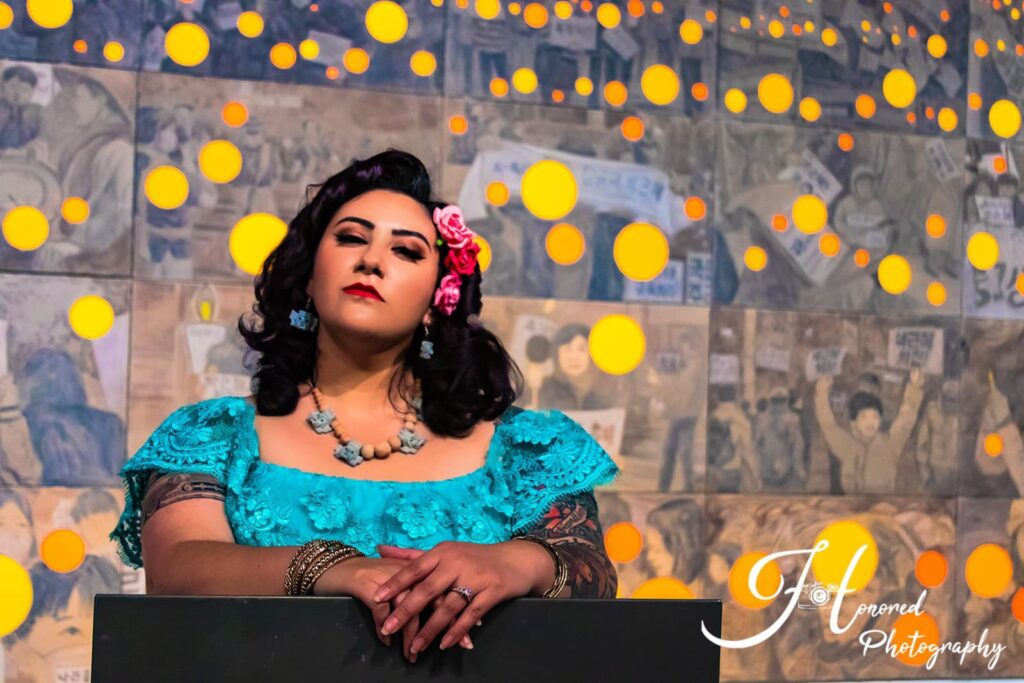
Photo Credit: Honored Photography
My guest for Comunidad Guest DJ this week is totally inspiring. Born and raised in South Denver, she's now helping educate the next generation of Southsiders. After working for Denver Public Schools for years, Lucero is also Executive Director of In Lak'ech Denver Arts - which she can explain below. In Lak'ech is ancestral - it's a Mayan way of expressing the idea that we are collectively one - "I am another you," and Hala Ken, "you are another me." Lucero's work in Denver reaches beyond the classroom, and extends throughout the community. Read more about Marianna, and check out 10 of her favorite songs, below!
| What do you do in the Denver community: I am an elementary dance and drama teacher for Denver Public Schools, and I am also the Founder and Executive Director for In Lak’ech Denver Arts, an after-school program that serves 5th-8th grade students in Southwest Denver with a community responsive arts education that engages them in broadening their social awareness, creating cross-cultural connections and inspires them into social advocacy within their communities and beyond. Tell me more about your background: I grew up in the Southside of Denver, right off of Evans and South Federal Blvd. I’m from a community that is so special, I would never dream of leaving it. Here, we come from cumbias, taquerias, back-yard parties, and familia first. We come from first-generation graduations, cruising slow on Sunday nights, and girls who wear big hoops and have even bigger dreams. Tell me more about your Latinidad: My mother, Rosa, is a huge influence on my positive cultural identity. She is a fierce Mexicana and a master story-teller, who continues to use her gift of cuento to bridge my present to my past. Her lively stories nestle me in the arms of a mother tierra that I never knew. Her words delicately paint the montañas of Canatlán, the crystal olas off the coast of Veracruz, and vivid memories of dance parties that were fueled by my abuelos special ponche. I collect her cuentos like lunares on my skin. Each freckle is a story, a song of familia, comida, and música. I choose to identify myself as Xicana because that is how I identify with my indigenous Mexica ancestors. I also grew up doing a lot of Xicano theatre at the Su Teatro Cultural and Performing Arts Center. Both my mother and the Teatro taught me how to honor my ancestors through storytelling. Why does representation matter in your community work: During my formal education in Denver Public Schools, I rarely saw my cultural identity reflected in my core curriculum or my arts education. This resulted in me having a low self-esteem as I anxiously tried to find my “place” in the arts and the world. I loved theatre, but I didn’t see people who looked like me acting in lead roles or teaching in arts positions. I also seldomly saw our stories being authentically represented on stage, but in 2007, my entire life changed. I became a company actor for the Su Teatro Cultural and Performing Arts Center. The Teatro empowered me as a young Xicana to seek the truth about my ancestors, and I was honored to play roles where I could step into the experiences of those that paved the way for all of us. When I became a drama and dance teacher for Denver Public Schools, I knew that I wanted to create an arts curriculum through our community’s lens. For the past eight years, I have had the privilege of teaching at Goldrick Elementary, a neighborhood school located in the same area where I grew up. Through our journey together, my students and I have devised powerful productions inspired by the rich traditions of ancestors and our families. Our productions provide a safe space for our community to expand their awareness around the social issues we face as BIPOC, and we also celebrate the beauty and joy of our barrio. As my students began to transition into middle school, they urged me to expand my programming beyond elementary because of the lack of cultural arts education in Southwest Denver. With their love and encouragement, I designed In Lak’ech Denver Arts in their image, an arts program where the community is empowered to reclaim the narratives and spaces that have been historically denied to our ancestors. What is one way the community can uplift Latin work/voices/art: One way that the community can help elevate our collective voice is by showing up for one another and supporting each other’s endeavors. Hype one another up, share posts, share resources, buy each other’s art, and DO NOT GATEKEEP. Colonialism would have us believe that resources are limited and that we benefit from withholding knowledge from one another. The system pits us against each other, but our ancestors urge us to reclaim our collectivist values, which emphasize the needs, wants and goals of a group over the needs and desires of each individual. We are extensions of one another, and the ancestors want us to rise up as such. |
Follow In Lak'ech Denver Arts on Instagram.
February 9, 2021
Comunidad Guest DJ: Victor Escobedo
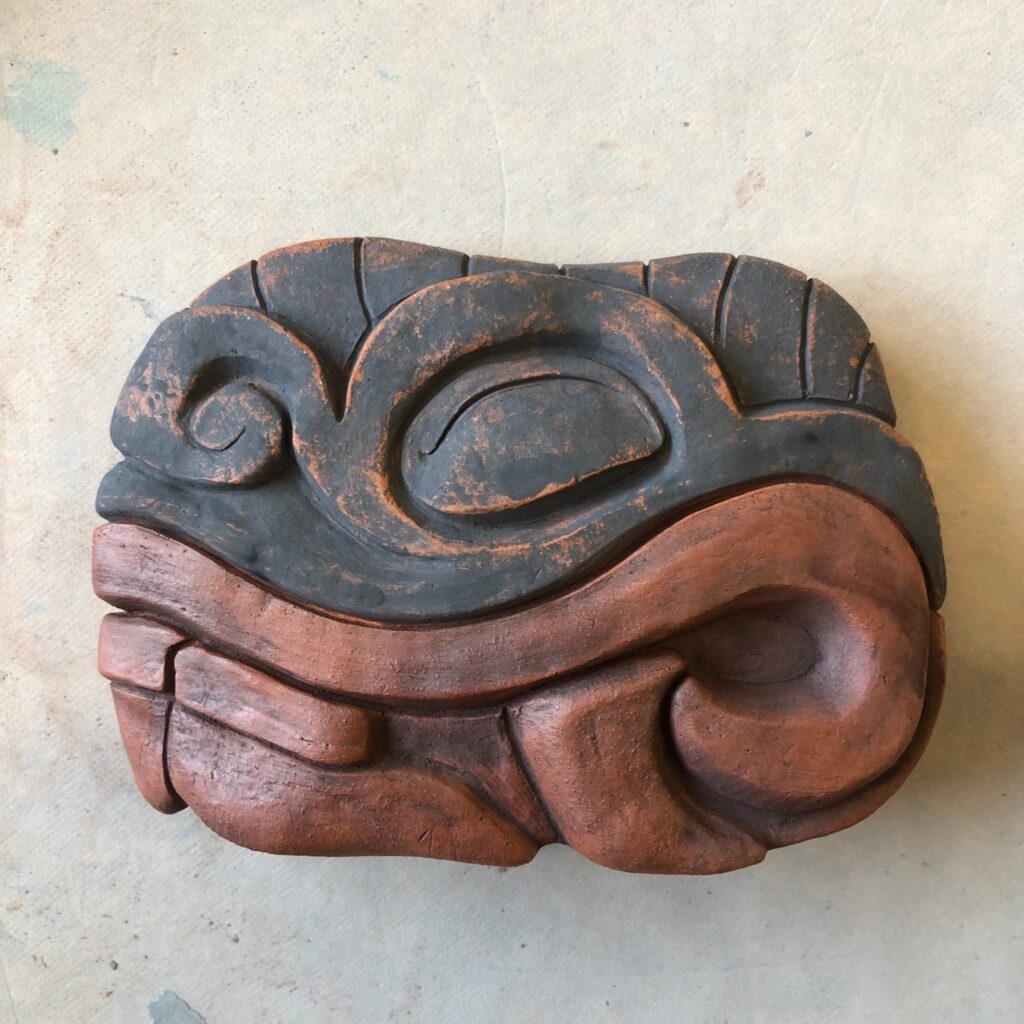
Photo provided by guest.
Esta semana, I'm excited to share the work of Victor Escobedo - a local artist who works in multiple mediums, including paint, clay, puppetry and so much more. Escobedo's art work is, in essence, ancestral work. Whether it's a mural, a puppet or something else entirely, he's honoring his ancestors with each piece he produces. You may have seen his work in CRUSH Walls, the Children's Museum in Denver, and in talks with the legendary Chicano muralist, Emanuel Martinez for History Colorado's Voces En Arte series. Escobedo has a lot coming up this year as well - read more, and check out his playlist, below!
| What do you do in the Denver community: I am a resident artist at Redline in Denver. I’m part of the Birdseed Collective, which is a very active organization all over the Denver area, particularly in Globeville, shoutout to the ‘ville. My partner and I organize trash pickups along Weir Gulch in the 80219 district of Denver. I’ve also worked with the Chicano Muralist council and the Latino Cultural Arts Center. Tell me more about your background: I was born and raised in West Los Angeles and moved to Denver in 2007 when gentrification made it difficult to make it in LA without illegal activities. I didn’t realize it then, but I came into Denver in what is now being referred to as the golden era of “old Denver.” I’ve been contributing to the DIY/art/street culture of Denver since I arrived. Tell me more about your Latinidad: As a first-generation US citizen raised by immigrants, I’m categorized as Mexican, but I identify with my Yucatec Maya indigenous roots. I’m taking steps to learn more about my heritage from a non-western, academic perspective, so if there are any Mayan elders out there, or if anyone knows elders they can connect me with, let me know! Thank you in advance. Why does representation matter in your community work: Because you don’t see us represented at the levels I’m at or where I’m capable of going. What is one way the community can uplift Latin work/voices/art: I’m not sure, I don’t identify as Latin. Though I have Mayan roots, I also recognize myself outside my 3rd dimensional body. Race and other categorization limit our mental capacity of understanding and connectivity to source, leaving us in a constant state of want and separation based on temporary, external forces. The soul is eternal. |
Follow Victor Escobedo, Redline Denver, and Birdseed Collective on Instagram.
Comunidad Guest DJ: Vivian Alexandra
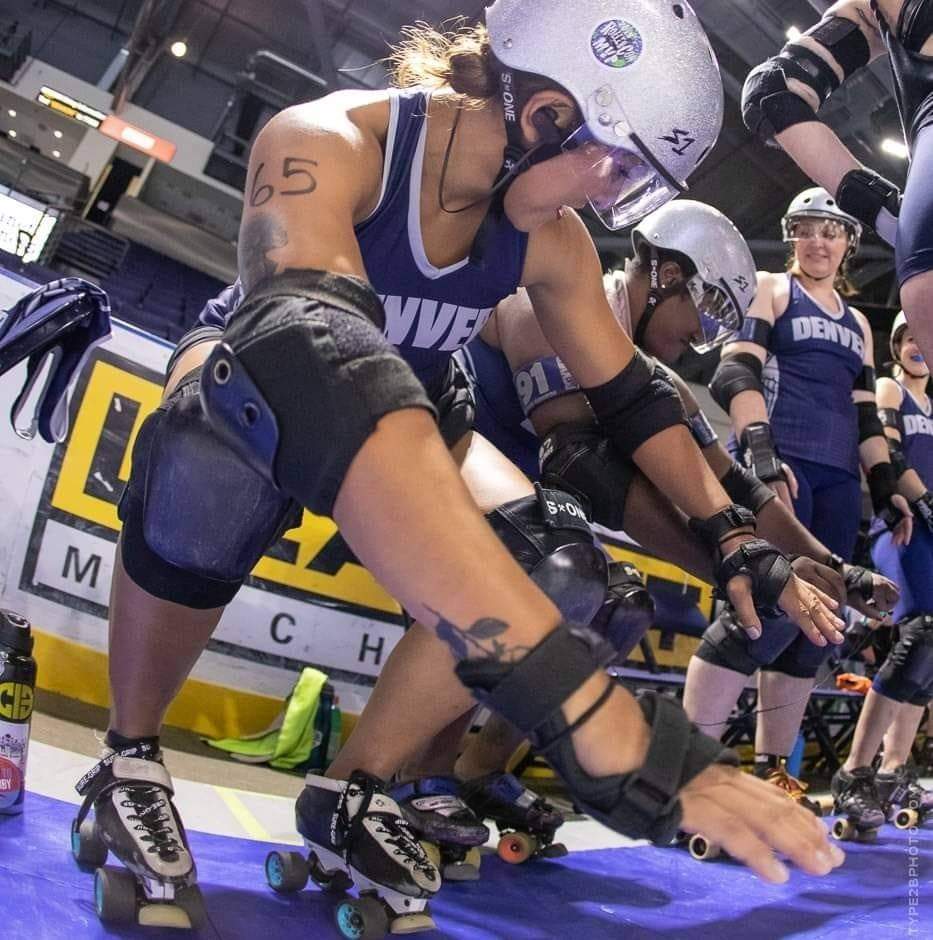
Photo Credit: Jules Doyle Photo
En una otra vida, I used to play roller derby (not very well). I still follow along, though - it is 100% my favorite sport. During the World Cup (yes that's a thing), I always support Team Indigenous and Team Mexico. Locally, well - there's no shortage of amazing teams here in Colorado (it's almost ridiculous how many amazing teams we have). Denver Roller Derby, aka DRD, is, in fact, ranked #4 in the world (the. world.). When I saw my guest this week was transferring from Team Mexico to DRD, well. I almost decided to lace my skates back up to even watch her practice from the sides (still might if we can ever play derby again!).
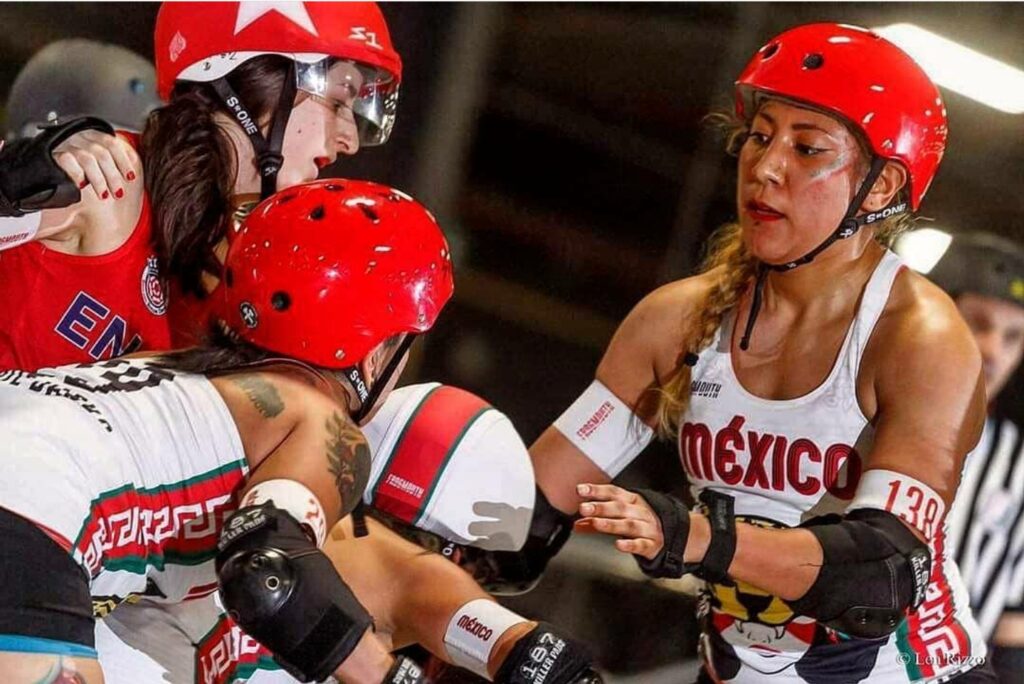
Photo Credit: Len Rizzo
Diosa Azteca is Vivian Alexandra, and I am so thrilled to welcome her as la comunidad guest DJ this week. Get to know V, and check out 10 songs she loves below!
| Tell me more about your background: I was born in Los Angeles, California, but I was raised in Mexico City. I have lived here for the last 2 1/2 years. What do you do in the Denver community: I am part of Denver Roller Derby League where me and two other members are the Latinxs of the entire league. I moved here because I do Roller Derby and I wanted to play it at a pro level. When I started to practice it in Mexico I became a huge fan of Denver Roller Derby, and also when I was teenager I used to come to visit one of my tias that lives here, which makes this place feel familiar for me. So it was easier to decide what place in the US to pick, and not less important, to help my family. I started to play Roller Derby in 2012, one of my friends in College invited me but I was not curious about it because at that time I was playing guitar and trying to start a band. Then when they did a video for Sprite showing what they do, and I watched on TV when I was at home I got knocked because it was powerful to see girls being strong, aggressive, fast, brave and at that time RD was very punk rock-ish too. I bought very cheap skates to start just to see if I like it and then the rest is history. I have represented Mexico twice in the World cup (Dallas, TX and Manchester, UK) I played for MCRD (Mexico City Roller Derby) they have been champions for three years in a row and I was part of that success two years with them. Then I transferred to Denver and now I am part of the 4th ranked team in the world. I got to skate with them as cross over but my goal is to be a base skater of the all-stars team, I need to keep working physically and mentally again because this COVID situation hit us hard. Tell me more about your Latinidad: I identified as Mexican, feminist and proudly Chicana, too. It has been hard to me to find a community where I can feel part of it. I think the main reason is because the language barrier - when you don't speak English fluently it is hard to create connections because you can't express yourself, to feel in a language that you are learning is difficult. Sometimes I felt that I had two personalities (haha it is weird but it is real, one in Spanish and other one in English). People can interpret that I am shy just because I don't interact as much as I want, sometimes I feel invisible and uncomfortable. It is hard and it is not easy to move from your comfort zone to start practicing and start to feel frustrated, and that feeling just reinforces the idea that I don't belong here. Then it is hard to match with people that does not share your roots, your culture, that doesn't know or deal with the struggles of being a minority, when they have other lifestyle/privileges and you have to keep working for "the American dream," or the goals that you have on mind in order to help your family, when they don't look like you, when they socialize in different ways that you don't know/like/understand. I have just a few friends because and I am working in making my community, it is challenging to start in a new place where you don't know people and you have to start from zero. But I have found people that I love and that I feel happy and grateful to have in my life too. It just takes time, every year is different and I feel more confident and every time I get used to more and more things. I have found small businesses, art projects, artists, social movements that enrich my life because they celebrate my culture, our culture and make me feel that I am not alone and that this is my home now. Describe your playlist: I am a punk rock girl and I have a very eclectic taste of music. But I realized that I like to listen to more music in Spanish, maybe because sometimes I am homesick and it makes me feel closer to my hometown. |
Follow Diosa Azteca, Denver Roller Derby, and Team Mexico on Instagram.
Comunidad Guest DJ: Jenna Manchego
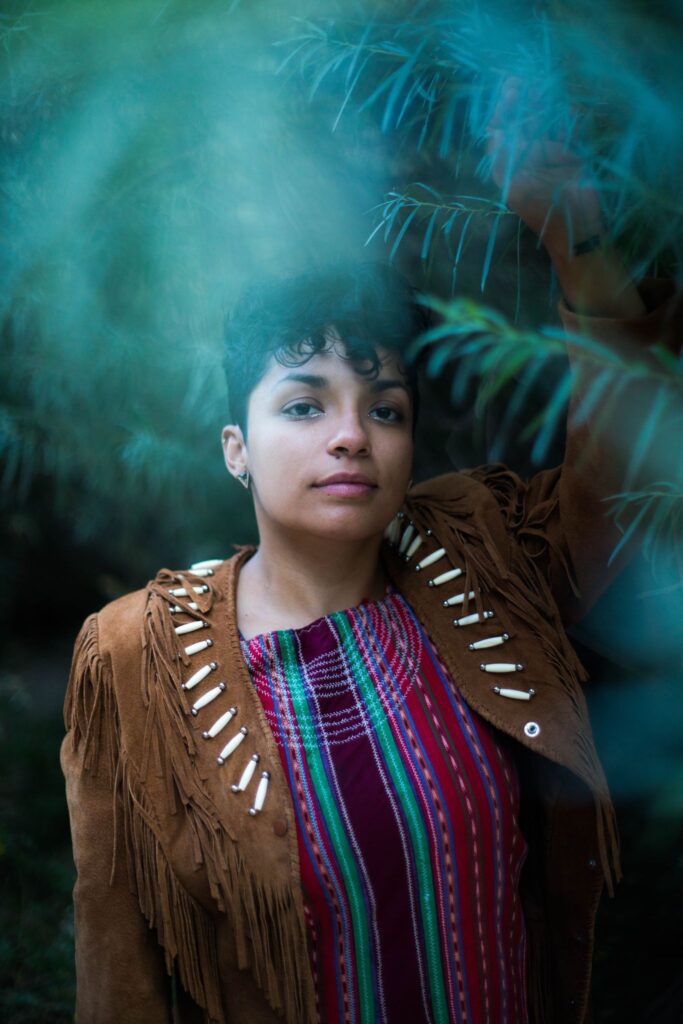
Photo provided by guest.
I feel like if you meet someone at an Itchy-O show it's a sign. Happy to have my my guest, Jenna Manchego, at such an occasion. Jenna does... all the things. An artist, but also a community organizer. An entrepreneur and also an investor. And many other things. Also, obviously a fire DJ by the playlist... dayum. Get to know Jenna better here, and check out 10 songs below!
| What do you do in the Denver community?: I am an artist, entrepreneur, birthworker, and gardener. Currently, much of my time is spent growing my business. The main focus is connecting people with tools and resources to build generational wealth by breaking cycles of scarcity and societally designed ignorance about finances. Birthwork, rematriation, social justice actions, and mutual aid are other parts of my soul’s work, and all of these aspects of my life have become more integrated, especially with the unfolding events of this year. Tell me more about your background: I was born and raised in southwest Denver, CO, in the Barnum neighborhood. Both of my great-grandmothers in my maternal lineage moved to Colorado as teenagers from so-called northern New Mexico. Because of colonization, assimilation, and how that manifested in my family through the years, I had to do a lot of my own digging about our true heritage, and history. After my great-grandmother Alicia Gallegos passed, everyone in my family had a different story about where we come from, and none felt accurate. Many romanticized our native ancestry while comfortably allowing our cultures and traditions to fade into obscurity. I only went to Pow Wows a few times as a child, and certainly didn’t practice any indigenous traditions growing up, with the exception of food preparation, which was an anchor for me in my journey of re-discovery. With the help of my cousin Malarie and some heavy lifting from our family in Utah, I was able to confirm our maternal last name was Candelaria (not their original name, but one of the first taken on from spanish settlers), and our family primarily lived in Abiquiu. My other great-grandmother’s family was from Questa, NM. Both areas are Pueblo territory, and in the early 1600’s when detribalization began, Abiquiu later became a Genízaro buffer settlement, where indigenous people from all over Turtle Island were brought to after being captured and enslaved. There is still so much more for me to uncover, learn, and confirm about my ancestry. It feels daunting, but is exactly the adventure and challenge my Spirit needs for the healing of my lineage. In learning more about my background, I’ve become more empowered in the ways I choose to engage in my local community. Since I was about 19 years old, I’ve volunteered in community gardening projects during different parts of the season, and this year in particular, developed a large garden from start to finish, with the help of my amazing friend Rayanna Schutt, and a tremendous amount of volunteers throughout the season during our social-distanced community work days. The majority of our harvest was donated, or offered at a low cost/sliding scale to people in our extended community. In birthwork, I’ve assisted with three births and one postpartum journey, while apprenticing with Melissa Ivey from 2017-2020, as well as doing self-studies. This summer I was asked to join a BIPOC centered birthworker collective to be able to serve new birthing families more comprehensively. I look forward to studying birthwork in greater depths from established indigenous teachers in the future (shout out to Pānquetzani, a.k.a. Indigemama, your courses are on my wishlist). I’ve also collaborated with many unaffiliated groups and mutual aid networks to provide food, masks, sanitary needs, tents, and survival supplies to our houseless neighbors throughout the pandemic. I’m overwhelmed with gratitude for the everyday people who’ve shown up to do what our governments won’t. The coming months and years seem to offer much potential in future collaboration and horizontal organizing of actions. Tell me more about your Latinidad: With all due respect to others, and our individual journeys in reclamation and decolonization, I don’t identify with the terms “Latinidad”, “Latino”, nor “Mestizo” and ESPECIALLY “Hispanic”. I am Indigenous. I am also of european descent. I am of the colonized people, as well as the colonizer, while learning to transcend the binary of both. I do not subscribe to the casta system that created some of the language either. Each of these words were created by colonizers to lump all people from so-called North, Central, and South America, under one homogenous term. It’s one of the more subtle attempts at erasure. “Latin America” was played up by Napoleon III in the 1860’s, to show a shared heritage between France and Mexico before his attempted takeover of Mexico. In more recent times, it’s become apparent that the term Latinidad and its cultural umbrella can be rampant with anti-blackness, and not inclusive of those who are descendents of the African-Diaspora, as well as indigenous descendents. I also understand this term serves a purpose for the time being, as there aren’t other terms to encompass this concept, but part of that is because it’s impossible to talk about a unifying factor between all of the countries and regions attempted to be included in “Latinidad”, without the discourse of settler-colonialism. That is its own conversation, which would require more space than seems appropriate to open up now. Why does representation matter in your community work: Seeing more urban Indigenous folks step into the work it takes to uncover and nourish our roots keeps me inspired and connected to the greater vision. Whether it’s financial education and empowerment, birthwork, mutual aid, or any other facet of my life, I seek to center BIPOC and QTPOC voices, experiences, and individual needs. Our collective of birth workers are predominantly black and indigenous, and we offer access to the same communities by subsidizing the cost from the families receiving care, through grants and donations. As an urban Indigenous descendant, who did not grow up immersed in any culture outside of “American” culture until I sought it out as an adult, having the opportunity to learn directly from wisdom keepers and people of similar heritage being willing to educate has been a lifeline for me. With the internet and social media, I’ve been able to cross-pollinate to many groups, as well as to individuals worldwide whom I may not have met as quickly without these tools. We are now able to leverage support and swift communication to, hopefully, help other people who feel disconnected from their ancestry tap into resources for learning and healing. What is one way the community can uplift Latin work/voices/art: One way that the community can uplift “Latin” work is to research artists, creators, and community organizers from our Indigenous and Black communities and center them. Focus on people who have been marginalized by a lack of proximity to whiteness, and offer support through purchasing their creations, paying them for their labor, sharing their social media handles and stories, and more. Uplift black and indigenous voices that are also from Latin American countries, regardless if they speak Spanish or “look” the part. |
Comunidad Guest DJ: Jennie Hurrieta

Photo provided by guest.
One of the stand out buildings (in my opinion) on Santa Fe Drive is Su Teatro. At first glance, its because of the mural work done by Carlos Fresquez, but en realidad, it's because of what Su Teatro is - which is a hub of Chicano arts and culture. My guest DJ this week is an integral part of Su Teatro, and an all around ANGEL, Jennie Hurrieta. I met Jennie through Denver's music scene, dancing at Pink Hawks and Los Mocochetes shows. Jennie works at Su Teatro, and is an important part of the Chicano community in Denver. Learn more about Jennie, and check out 10 of her favorite tunes below!
| What do you do in the Denver community: I have been working at Su Teatro, a nonprofit Chicano theater company, for about five years doing their finances, as well as running the box office and the internship/work-study program. Tell me more about your background: I was born and raised in Denver. My mom's family is from El Paso/Juarez and my dad's family is from Southern Colorado and Michoacán. My family started out in the Westside of Denver but moved toward Littleton when I was around 7; my mom, an educator, wanted us to go to the best schools so off we went to the suburbs. It was hard to be a brown girl in a very white community - I took flight after high school, attended MSU Denver and now I am lucky enough to live back in the Westside just two blocks away from my grandpa and tia's house where my dad grew up. Tell me more about your Latinidad: I am Chicana. I am the hyphen between Mexican-American. With a mother who speaks Spanish and a father who doesn't, I am the brown girl with a smile she hopes might hide the fact that she is only catching half the conversation. I was able to start exploring my Latinidad more in high school when I joined the La Raza Youth Leadership Institute, where I was able to be educated on things that I was completely unaware of, it was a game changer. Why does representation matter in your community work: Working at a theater company representation matters because it is important for brown people to see other brown people on stage. Too often have we been left out or cast-typed, but at Su Teatro, a majority - if not all the actors - in each production are brown. We are able to show the stories of our community, with members of the community. In addition to being a theater company we are also a non-profit. We take on high school and college interns and give them a first look at a career in the arts, something they might not have thought about before, but now have experience to put on their resume. It matters to build up the youth in our community and have representation at all levels. What is one way the community can uplift Latin work/voices/art: The community can uplift our work, voices and art is through support. Support can come in many ways, through listening, responding, purchasing, showing up, tuning in, offering words of wisdom, I can go on and on. Just don't silence us. |
Follow Jennie on Instagram here.
Follow Su Teatro on Instagram here.
Comunidad Guest DJ: Cal Duran
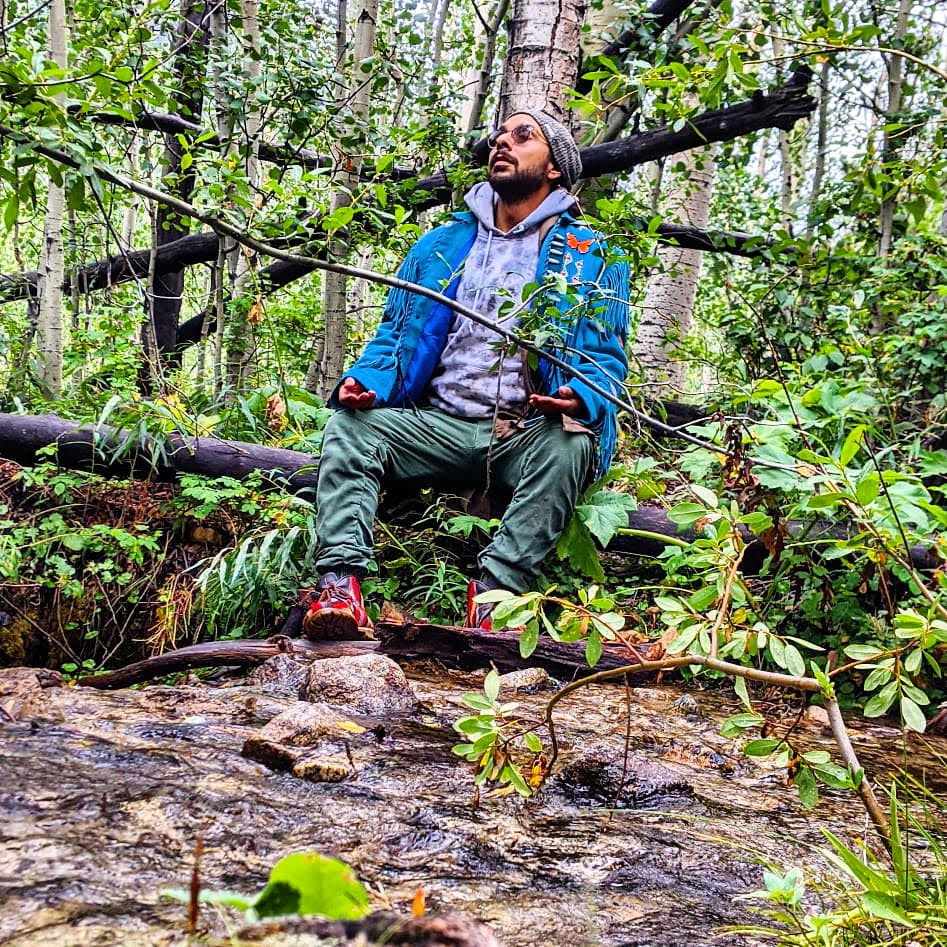
Photo provided by guest.
I think the reason why I love Cal's artwork so much is because it's so ancestral - a key part of why he creates in the first place. I knew of Cal's work from long ago, but couldn't pin down why - but it was because he had shown at Pirate Art Gallery when it was still in the Northside, along with one of my closest friends. Today, you can find Cal in the studios at Re:Creative on Santa Fe, and you'll be seeing a lot more of him in the coming months. It's been a real gift getting to connect with Cal - and this playlist he made below? It's blowing my mind. Read more about Cal and check out his playlist below!
| What do you do in the Denver community: Artist, mud brother, connector to the past ones, star seed, and art educator for a youth after school program at davarts.org Tell me more about your background: I grew up in North Denver . My roots lay deep in the indigenous tribes of Colorado and New Mexico. I started really focusing on art in high school. Needing to release and escape the moments in my life that felt unsheathed. When I was 17, my art teacher told me to start just applying to galleries in Denver. I also had an amazing mentor, Marie Gibbons - she was a member at Pirate Art Gallery in North Denver, a staple and gem in the community for 30 years. I applied, and got in as the youngest member they had, and I had my own solo show that year. I've been showing, teaching, collabing in the Denver arts community ever since always making sure I have a studio space and reaching out through creation. Art has the ability to heal and connect deeply to our culture and ancestors. Tell me more about your Latinidad: I identify as Mestizo mixed blood and honor all sides of my ancestors. I didn't really grow up with traditional Latinidad culture. My mom was adopted, and my dad in and out of my life. I had to rely on my intuition and calling from Spirit. Art allows me to tap into the imagination and see my roots clearly. I honor my Spanish side, I honor my Indigenous side, I honor my east Indian side - all of these connect and ride parallel within each other. It's been my journey to see how my cultures relate to each other as we are all Earth keepers of this realm. We just have to embrace it with open arms . Why does representation matter in your community work: I knew when I was young , that I had to share my visions . Stories and images would appear like fast sparkles in my mind, and I'd pick them out and I'd see the stories of my ancestors calling me, guiding me like light in the dark. Art is my voice, visual art is my loud voice. A voice with out words. It is my duty to share my visions with others. Stories that have been stolen, traditions that have been erased. By making sure I create these images constantly and getting them out to the community makes me feel whole. Teaching our youth these same traditions is my legacy. It is important we as Latinidad mentors, fathers, mothers, sisters, brothers that we make our presence and light shine now more then ever . If we come together and support one another we can see change. What is one way the community can uplift Latin work/voices/art: Support each other, praise one another, be happy for another's success, compliment each other, collaboration, purchasing, listening to each other's stories . Art is not a competition - I see a lot of drama in our communities; when ego gets involved it causes fear, anger, hurt. If we do more uplifting, and spread our gifts and love we can uplift one another and share our passions. |
Follow Cal Duran and his work here:
@volarduran
www.artbycal.com
Comunidad Guest DJ: Alejandro Flores-Muñoz
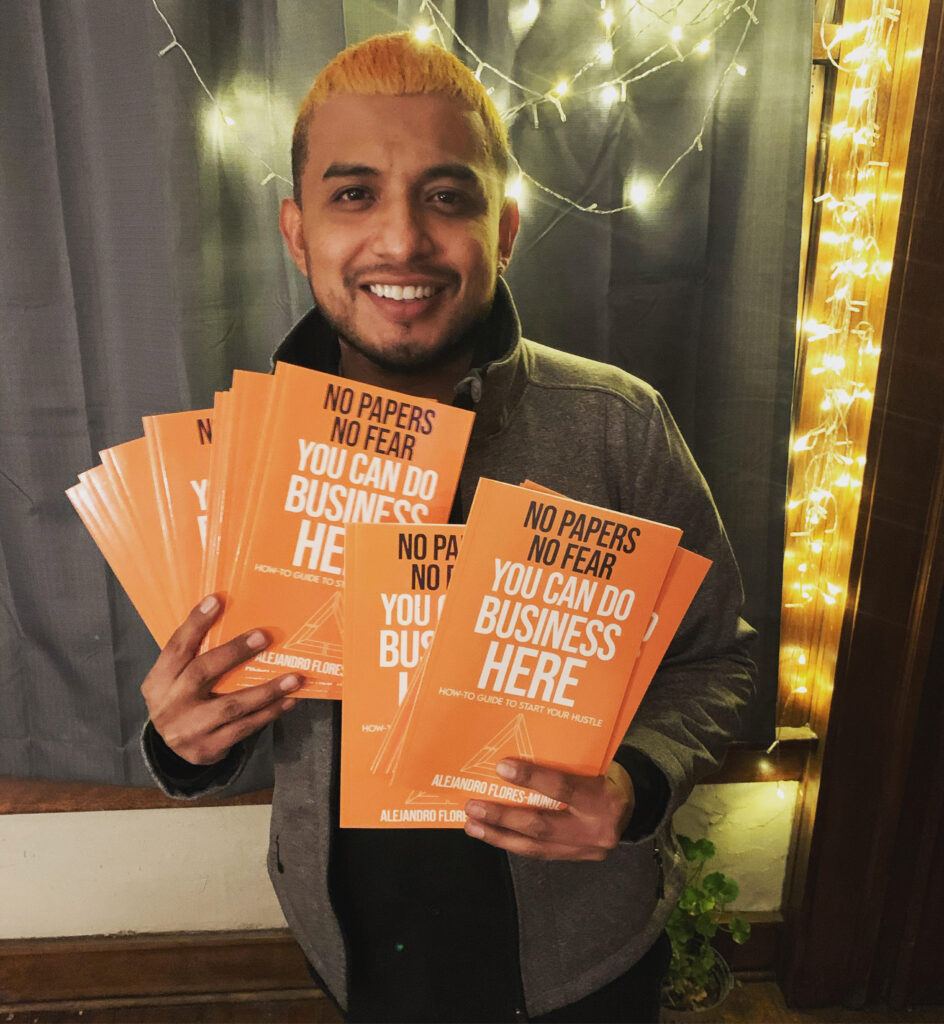
Alejandro Flores-Muñoz is one of those people that just seems to be doing everything. He's an entreprenuer, helps produce the UndocuHustle podcast, and is an advocate for multiple marginalized groups in our community. His latest endeavor? Or, I should say, endeavors, include a brand new food delivery service, Combi Taco - which is basically a taco truck delivery (mis sueños se han hecho realidad) and a new book, No Papers, No Fear You Can Do Business Here, about being an undocumented entrepreneur, which he is. Alejandro is wholly inspirational. Read more about him, and check out some of his favorite tunes below!
| What do you do in the Denver community: I'm a seasoned entrepreneur and activist who has made it my mission to advocate for marginalized communities. As an outspoken queer, DACA, Latinx person my life’s work aims to champion for the next generation of intersectional entrepreneurs. Tell me more about your background: Brought to the United States by my mother in 1997, I had strong progressive values instilled into him from a young age. I live in Denver, Colorado where I work directly with local agencies and non-profits as one of the leading advocates for the DACA community and sit as the board chair for COLOR Action Fund, and am a Governor appointed board member to the Colorado Minority Business Council. My willingness to be open about his experiences have landed me commentary roles at leading media outlets like CNBC Millennial Money along with a coast to coast speaking tour. I relocated to Denver CO in 2016 after accepting a position as a state-wide director for a progressive electoral campaign. Tell me more about your Latinidad: Twenty-three years ago, my mom brought my brother and me from Guadalajara to the U.S. in search of a better life. I have her to thank for the opportunities and career I now have. Seeing her in one of her first jobs as a canvasser not only instilled in me a strong work ethic, but the importance of building community power. These traits are what sparked in me my entrepreneurial spirit and are what drive me forward in my business and activism every day. But let’s be honest, getting to where I am today hasn’t been easy. As an immigrant and Deferred Action for Childhood Arrivals (DACA) recipient, I have encountered barriers every step of the way. I persisted with many side hustles to gain a sense of economic security until I could eventually turn one into my main hustle. This journey is one that I want to share with people and I have done that through a how-to guide "No Papers No Fear You Can Do Business Here" I’m sharing my story to help others see entrepreneurship as a viable option for themselves, particularly immigrants and people of color hoping to scale up their businesses. Why does representation matter in your community work: Too often my community is only making enough to survive. I want to create wealth — not only financially, but in terms of opportunities and leadership advancement — to pass down to future generations. I don’t want people to worry about how to pay for college or put food on the table. Instead, I want communities of color to achieve a level of economic independence that makes it easier for us to fight for policies that create meaningful change. Policies will only reflect our needs when we are represented and heard. Only when people of color and immigrants have a seat at the decision-making table with other business owners will we have the power to create and enact policies that truly benefit us, now and in the future. We are committed to meeting the needs of our community; it’s time that people in power give us the opportunity to do so. |
Comunidad Guest DJ: Mariah Bottomly
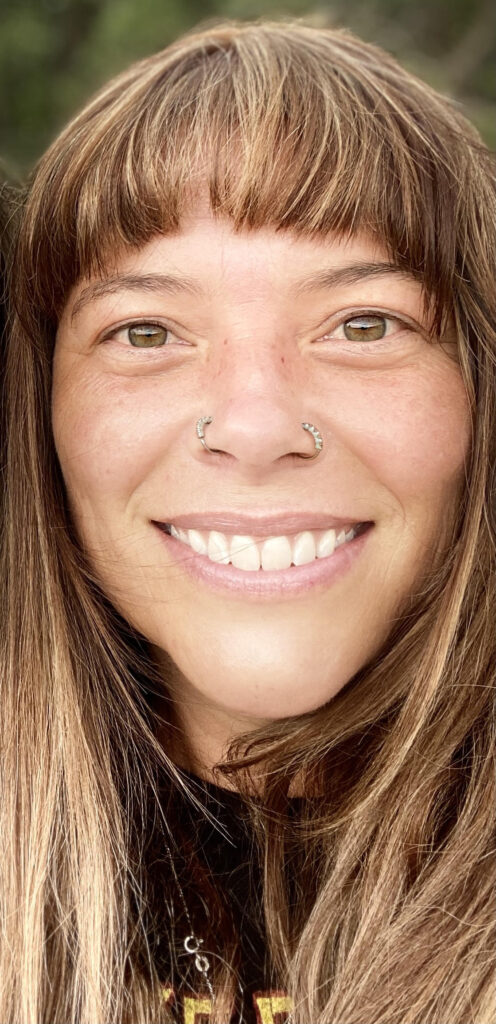
Photo provided by guest.
This week's Comunidad Guest DJ is such a powerful and amazing woman here in Denver - Mariah Bottomly. It seems that she's everywhere within the community and there's good reason for it - she simply embodies the meaning of comunidad. She's one of the most supportive folks I have ever met, and I'm excited to share her work here this week!
Mariah is not only a photographer, but also a doula and birth worker, but she also carries the medicines and knowledge within the Chicano community. Mostly though, she's a fierce friend to many - and a damn good guest DJ (a mujer after my own heart - when asked to pick 10 songs, she said, "just 10?"). Read more about Mariah and check out 10 songs that inspire her below!
| What do you do in the Denver community: I am an educator, full spectrum doula, ancestral medicine keeper, professional photographer, mama and sister-friend. Tell me more about your background: I am originally from Santa Fe, NM, born and raised. I spent about seven years in San Diego, moved to Albuquerque, NM and eventually found my way to Denver. All of my best friends are poets so, I would frequent poetry shows. I started photographing poets, shows and slam teams in the community. Quickly, I came to find everyone here in Denver is connected in some way, very much like where I grew up in Santa Fe. It is easy for me to navigate through all of the beautiful communities that are Denver. Tell me more about your Latinidad: Yo soy Mestiza. My father is from Espanola, NM. I found through my lineage that my ancestors came from Spain, through Mexico and "settled" in Pojoaque, Espanola, and surrounding areas. Some of my ancestors already existed here so, my indigeneity comes from my relatives from the Ohkay Owingeh pueblo, formerly known as San Juan pueblo. My patriarchal ancestry comes from the colonized and the colonizer. (So does my matriarchal side). It has taken some time to embody, move through and heal through all of that. The healing continues. Here in Denver, I have really connected to my ancestral medicines on these lands. I have been extremely fortunate to be able to learn from, practice with and work through some highly revered gente, in all regards, with everything I do. My medicine practice, the way I educate, my art and how I present myself in community is a reflection of this. Why does representation matter in your community work: For hundreds (thousands) of years, my ancestors have had to survive colonization, oppression, genocide and gentrification to ensure that our cultura, remembrance of our sacred ways and our warrior spirits remain intact. Because of this, I have been blessed to work in all my facets, with amazing curanderas, y curanderos, artists, brujxs, activists, danzantes, poetas, y todo. I have had an an extremely strong calling though, to go overseas to connect with my ancestral elders and medicine keepers there. With permission, I want to bring back the medicine and share it with those who connect with it as their own ancestral medicine(s) so that those of European descent will stop commodifying, appropriating, and using medicines, practices and sacred ways that aren't theirs to keep. Don't get me wrong, medicine and healing is for everyone and when it comes down to it, it's all the same, and we are indeed all connected. But, one thing I have noticed in my life and thorough all of my practices, is that a lot of ancestral pain has come from and through spiritual bypassing. It is my responsibility to make sure that I'm able to bring my authentic self in all of these truths. To represent the best way that I have been taught and know how to, is to keep questioning and speaking up when there are micro-aggressions, injustices, questionable and outdated materials and spiritual bypassing, to name a few. To acknowledge and participate in our uprisings, and work dutifully every day in everything I do to ensure that our practices remain intact and sacred. What is one way the community can uplift Latin work/voices/art: I feel that it is imperative that we create, recognize, and maintain in our commUNITY vessel, not only our past practices, lineages and heritages that connects us all but, we also continue to council, advocate and navigate through all of our beautiful differences. |
Comunidad Guest DJ: Desiree Ortega-Stange
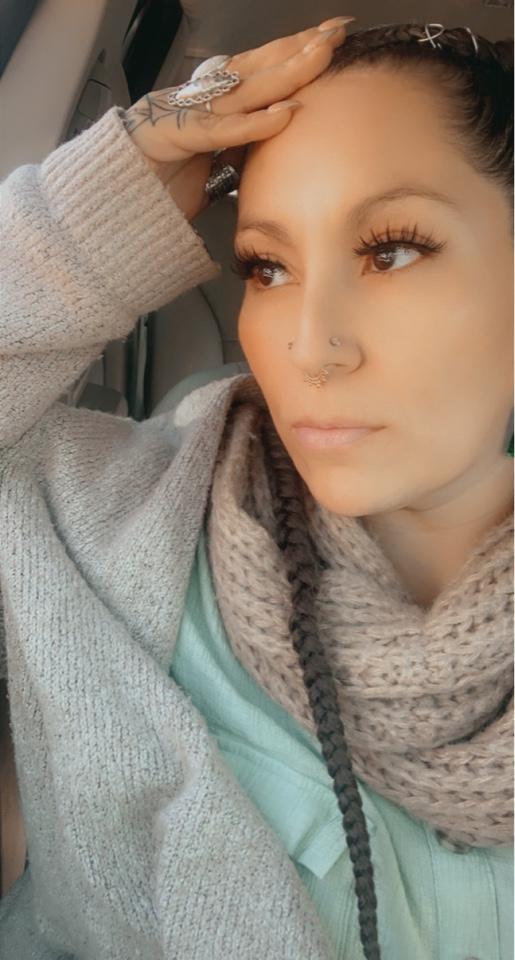
Provided by Guest
This week's Guest DJ from la comunidad is Desiree Ortega-Stange. An Aztec danzante and leader in the Chicano Community here in Denver. I actually met Des when she and her husband held ceremony for some friends who were married by the two. I had seen Des and her family at different community events at La Raza Park and more, so I'm grateful to be able to showcase her community work here this week.
Get to know Des a bit better, and check out her fire playlist below of 10 songs she's inspired by!
| What do you do in the Denver community: I am an 23 year Indigenous Aztec dancer in the Denver community and Licensed massage therapist. Tell me more about your background: I am a proud born Denverite born right smack in the middle of Denver just a hop skip and jump from the old Mile High Stadium in the Sun Valley projects which are getting torn down as we speak. I love the Denver community, being involved in community is in my blood coming from a mother who marches with the Chicano Crusades for Justice. Tell me more about your Latinidad: I am a proud Chicana/Indigenous woman who has been involved in community since the age of 16, when I joined a group called Semillas se la Manana for young girls who are trying to get out of gangs or avoid joining gangs, and at the time found the Danza (Aztec), and then started my education in my ancestors, and the importance of the youth know where they originate and having pride in that. Why does representation matter in your community work: My opinion has always been, as Chicana/ Indigenous woman, to make a direct impact on the community as a whole is to instill in my children this same knowledge and pride in where our ancestors are from and who they were. What is one way the community can uplift Latin work/voices/art: Again I think the best way to uplift the LatinX/Chicano/Indigenous voice/work and art is through education. All forms - not only school, but in our homes, starting with educating our adults. Latinos supporting Latinos, buying from mom and pop or small businesses ran and owned by Latinos. |
Communidad Guest DJ: Franklin Cruz

Photo Provided by Guest
Franklin Cruz is un regalo. Franklin is all around inspiring - I was introduced to them through their poetry (which has made me cry real tears), and then the breadth of amazing work they do kept showing up. A danzante. An educator al museo (what!? Dream). And they're just amazingly sweet and fun. I'm excited to share with you Franklin Cruz!
| What do you do in the Denver community: I'm a science educator at the Museum of Nature and Science, a spoken word artist, dancer, emcee and writer. Tell me more about your background: I first got introduced to the Denver community through a friend who took me to my first open mic and slam with the youth organization Minor Disturbance. After that I worked my way into the adult scene and then into dance. I was studying biology the whole time and later worked that into my art. It just caught people's eye and I started being invited to share in different spaces, mainly with Latinx, LGBTQ and immigrant communities. Tell me more about your Latinidad: My family is from Mexico and we come from Raramuri and Pima people from the northern part of Chihuahua in the North of Mexico. I identify as an Indigena Mexicana now as I discover more of my roots. Why does representation matter in your community work: Representation in my work is creating spaces for visibility without erasure. Often there are communities being removed from sight to appease a larger discriminatory preference like with LGBTQ and immigrant communities. When represented authentically these communities have demonstrated their large capacity for affecting positive social change. What is one way the community can uplift Latin work/voices/art: Language inclusivity, many communities don't speak English as the language of their heart. Organizations like the community language cooperative help in making spacing more inclusive to both presenters and audience by giving access to non-English speakers to be understood and to understand the context they are in with ease and they work with community. This will expand the audience and talent pool we can share with. |
Comunidad Guest DJ: Raven Porteous-Mena

Provided by guest.
Las mujeres en la comunidad son inspiracional. Especially in education. Especially when they run their own small business on top of that. Such is the case with my guest DJ this week, Raven Porteous-Mena. I followed her small business, Por Vida, on Instagram and loved that she was creating goods celebrando la cultura - and helping out the community in the process. That's a key component to her work in education as well.
Read more about Raven - and check out 10 songs she loves - below!
| What do you do in the Denver community: I am the Dean of Students at East High school, I focus a lot on our community youth, social emotional learning, educational equity for our Black and Brown students, and incorporating art into mental health treatments and behavioral outlets. Tell me more about your background: I am a first-generation person in the USA, my parents are undocumented immigrants from Mexico. I was originally born in Houston, Texas. Moved throughout the West from New Mexico to California and finally settled in Denver, Colorado, when I was 5 years old. I got heavily involved in the Denver Community as a 19-year-old College student at MSU Denver. My involvement started with an organization called Journey Through our Heritage run by Dr. Renee Fajardo, focusing on community education programming, Cultura, Art and Latino History. I fell in love with the game and at 29 years old, I never left. Tell me more about your Latinidad: I am Latina, Mestiza if you will. These are my people, my tribe. With such strong roots in Yucatan, Mexico, where all my family still lives, to Spain, where I have a grandmother, to the the wild west, these are lands my ancestors worked. The Latina/o community here in Denver feels like home. Why does representation matter in your community work: Representation is SO IMPORTANT IN EDUCATION. Students of color are swept under the rug or pumped into a pipeline to jail every day in our education system. School choice has segregated out communities creating vulnerable pockets in our society. Representation for these students is necessary to navigate a system that wasn’t built for them. Without representation the 1946 case of Mendez v. Westminster prohibiting segregation in California’s public schools would not of been possible. The activism of Cesar Chavez and Corky Gonzales was representation that to this day its ripple effects are coating our community. Representation is needed for the safety and success of our minority students. This also goes for the Art scene in Denver too, representation is needed not only in street murals but in art administration as well for equity. Sit on a board, make our voices be heard, take control of the narrative because we are all still here and need a strong voice in Denver art and education. What is one way the community can uplift Latin work/voices/art: Curate Art Shows, share our posts, come to our events promote your favorite Latin owned business and brand. Shop local, I guess what I am saying is as a community my success will help your success, we are all connected so supporting each other through it all will create a stronger sense of talent, service, art, family, love and community |
Follow Raven Porteous-Mena and her work here:
@por.vida.mija
@kissin_the_sky
Comunidad Guest DJ: Alicia Cardenas

Provided By Guest
Continuing Especial's celebration of Latin Heritage Month, I present to you Alicia Cardenas. She is la jefa y la chingona artista at Sol Tribe Tattoo & Body Piercing on South Broadway, she's a muralist who - this year alone - has walls featured for the Crush and Babe Walls Festivals, and a leader in the Denver Chicano community.
Learn more about Cardenas here, and check out 10 songs she's inspired by below!
| What do you do in the Denver community: I am an artist , local business owner and community organizer. Tell me more about your background: I am a Denver Native who has owned a business for 23 years. I am a traditional Aztec dancer and performance artist. Tell me more about your Latinidad: I am a Chicanative (combo of Mexican American and Native American) I am cihuatl yoatl - Woman warrior. Why does representation matter in your community work: Representation is everything. Especially for women, queer people and Native Mexican Americans. I feel a great responsibility as a mother to make a world where my child can show up and be appreciated. Seeing a woman's perspective through art is an important part of getting the balance back from a patriarchal society. What is one way the community can uplift Latin work/voices/art: More visibility always with more specifics on the different groups within the " Latino" heading ... Those of us that are a mix of both Native North and Central American ancestry, Mestizo, Native American from the pueblos of the Southwest. Not grouping all People of Color together. Give us a chance to create art in public spaces. You also create music, tell me more about that: I am a traditional Aztec percussionist which includes large drums, Teponatzlis (Aztec wooden percussion instrument) , hand held drums and string instruments including a Concha (Similar to a Mandolin). All these instruments are parts of ancient ceremony and not necessarily for entertainment, they are an important part of reclaiming the ancestral knowledge of our people. You can find me playing in ceremonies but rarely in performance. |
Alicia Cardenas Guest DJ (Playlist):
Follow Cardenas and her work here:
@soltribemama
@soltribe
soltribetattoo.com
Comunidad Guest DJ: Robert Castro

Provided by Guest
For Latin Heritage Month, I wasn't sure what else I wanted to do - after all, Especial is a weekly celebration of Latin-made music. So, I decided I wanted to take to la comunidad. Denver is, of course, rich with la gente, and I wanted to highlight a few folks from around town who are making things happen outside of music here in town.
First up, Robert Castro - photographer, jefe at Ultra5280, and all around good guy, especially when Team Mexico is in the World Cup (we have shared in the splendor!). Learn more about Castro here, and check out 10 songs he's particularly inspired by below!
| What do you do in the Denver community: I am the Editor in Chief of the online entertainment magazine Ultra5280. We focus on our local scene as a priority and help artist to help promote their projects. Tell me more about your background: I was born and raised in El Paso, Texas and moved to Colorado in 2005. After moving here I took two of my passions music and photography and started up a music website, which has now expanded to cover all areas of entertainment in Denver such as art, food and wine, and of course music. I studied Sports Industry and Operations and Marketing at Metro State, and the similarities between sports and music are very similar as to the end product is basically entertainment. Tell me more about your Latinidad: As a Hispanic owner of my magazine (which is an official LLC) I have a chance to focus on our Latinx community and help promote their art whether it’s a new album they are releasing to a new menu from a chef, to an amazing art exhibit. My goal has always been to put my community first and give them a means to help promote themselves in a way that is hard to do (especially in our current situation). Why does representation matter in your community work: Not only do I help promote these artist with our publication, but I also provide guidance on how to submit their material for inclusion in press. It could be anything from helping them with photography for their promo, how to create an effective electronic press kit, as well as putting them in touch with the right people. Having done this for over 15 years I have established a networking channel to make sure the they are receiving anything I can give them in order to help succeed. We also help support certain non-profits such as Youth on Record by working with a variety of their artist and charitable efforts. What is one way the community can uplift Latin work/voices/art: Community plays a huge role in the success of these artist. While we are going through a pandemic and much of the arts are suffering it is important to channel other ways to support artist. One that has been particularly effective is buying the artist music, merchandise, donating on their live streams, promoting their art through one’s social media. We learn to adapt and while we face an uphill battle to get back to were we once where, it is still important to use these means as a away to keep these works of art still thriving. |
Follow Castro and his work here:
@castro_denver
@ultra5280
